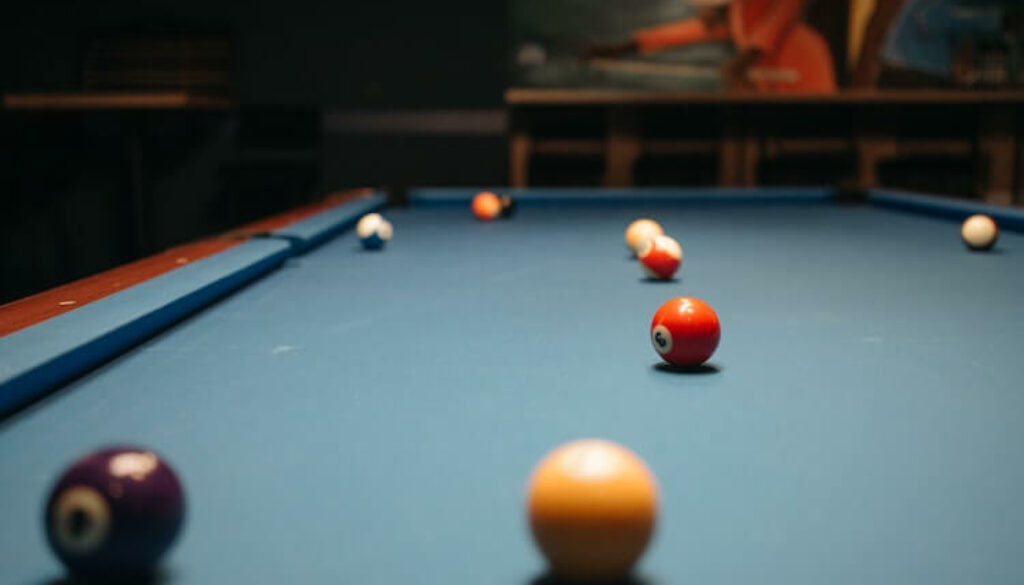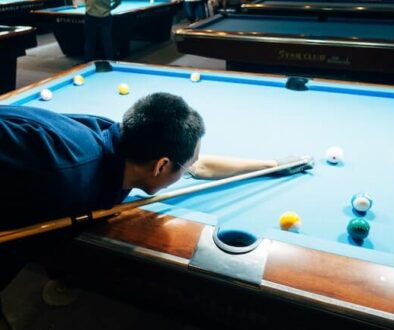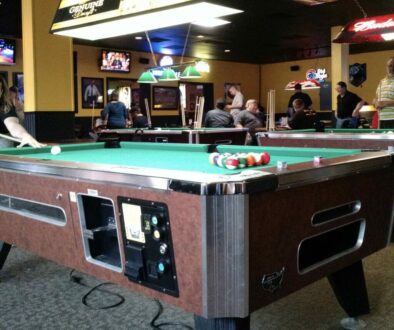Billiards vs. Pool – Are They Really the Same Thing?
It is common for both pro and amateur pool players to use the terms “billiards” and “pool” interchangeably.
While billiards and pool refer to games played on tables that look the same and use similar elements like cue balls and cue sticks, they aren’t exactly the same thing. There are several characteristics of both that set the two terms apart.
In this article, we’ll explain what the terms pool and billiards mean and what makes them different. We’ll also provide a brief history of the origins of each. Let’s start by looking into the question – what is billiards?
What is Billiards?
Billiards is a general term that refers to any type of cue sport. The sports are played on a billiard table with a specific number of balls and cue sticks. Most billiards games are played both competitively by professionals or casually.
Here are the most common billiards sports:
- Carom/French billiards – Played with 3 balls on a table with no pockets
- English billiards – Played on a 6-pocket table with 3 balls
- Pool/Pocket billiards – Played on 6-pocket with up to 16 balls depending on the game variation
- Snooker – Played on a larger (12-foot long) 6-pocket table with a total of 22 balls
When did billiards start?
Billiards originated somewhere in Europe in the 15th century, although the origin is not known for certain. The sport is believed to have originated in either England, France, Italy, or Spain, and each country has different historical accounts.
Billiards started as an outdoor sport – a lawn game that was played in a similar way to croquet. As the game evolved, it was moved indoors.
People eventually started playing on wooden tables covered in green cloth to replicate the appearance of the green lawn grass. The table was also fitted with a border (rails) on the edges to prevent the balls from falling off.
How did billiards get its name?
The term “billiards” comes from either the French word “bille,” which means balls, or the word “billart,” which translates to wooden sticks. While there is no definite proof of origin, there is some consensus that the word has French roots.
What is Pool?
Pool is a variation of cue sports played on a 6-pocket table. The table has pockets in each corner and one each at the center of the two long rails. The sport is formally referred to as “pool billiards” in Australia and most of Europe, and “pocket billiards” in North America.
Billiards evolved from its croquet-like beginnings within a reasonably short time, which led to the development of pool and other variations of the sport.
Different factors were driving the evolution, but changes in player preferences and the onset of the Industrial Revolution are the main causes.
The maces (sticks) used to move balls on the original billiards tables did not work well – especially when hitting balls on the edge of the table or near the rails. This led to the development of more modern cue sticks in the 1600s. Once players had a better way to hit balls, the tables also had to improve to keep up with the changes.
In the 1700s, players agreed on uniform billiards table dimensions. A finalized playing surface then led to the emergence of new game rules and variations for the better part of the 19th century.
Pool has continued to evolve over the years. There are now a substantial number of games that are considered “pool.”
Most popular pool games:
- 8-ball – The most famous pool game. Also known as solids/stripes or spots/stripes. It is played with a total of 16 balls. The objective is to sink all solid or striped balls, followed by the black 8-ball.
- 9-ball – A more modern pool game that emerged in the USA in the 1920s. It is played with 10 balls – the cue balls and 9 balls numbered 1 to 9. The objective is to pocket the 9-ball, but you must first hit the lowest-numbered ball.
- 3-ball – Played with 3 balls by two or more players. The objective is for a player to shoot continuously until all balls are pocketed. The player that pockets the balls with the fewest shots wins.
- Straight pool – Also called “rack pool” or “14.1 continuous pool.” The goal is to pocket all 14 object balls. Players can do it in any order, but they must call the ball number they want to pocket and the intended pocket before every shot.
- One-pocket – A strategic 2-player game where each player is assigned a specific corner pocket. The player can only pocket balls in that specific pocket. The first one to pocket 8 of the 14 object balls in their pocket wins.
How did pool get its name?
The term “pool” gets its meaning from collective betting. The act of putting money together in a collective bet is referred to as pooling money.
The emergence of the term can be traced back to the 1800s when patrons would meet in poolrooms and place bets on horse races.
Owners of these poolrooms needed a way to keep the patrons entertained between races, so they brought in billiards tables. Because of this, the connection between billiards and poolrooms stuck. Most people began to refer to the game of billiards they played in poolrooms simply as “pool.”
Are Billiards and Pool the Same?
Billiards and pool are not the same. Despite the many similarities in the equipment used and the fact they are both associated with cue sports, they are very different.
All pool games can be considered billiards. But, the reverse is not true. Billiards is an umbrella term for all types of cue sports, not just pool. Pool is a type of billiards game played on a 6-pocket table.
It is also important to note that “billiards” is often used to refer to carom or French billiards. Carom billiards is a cue sport that uses only 3 balls and is played on a table without pockets, while pool can be played with up to 15 object balls plus the cue ball. A carom billiards table can also be up to 10 feet long, while pool tables are anywhere from 6 to 9 feet long.
Why do some people call billiards “pool”?
People call billiards “pool” because pool games such as 8-ball and 9-ball are the most common games in many parts of the world.
Given that the tables and other billiards equipment are similar to what is used in pool, it is easy for inexperienced people to assume they are all the same.
Wrap Up
Many people use the terms “billiards” and “pool” interchangeably. We hope it’s now clear that they don’t mean the same thing. Billiards is a general term that refers to all cue sports, while pool refers to a collection of specific cue sports played on the 6-pocket billiards table.
Sometimes billiards is also used in reference to carom billiards, which is a game played with 3 balls on a billiards table with no pockets. But, to avoid confusion, it is important to be clear about what sport you are referring to.
Happy Shooting!



